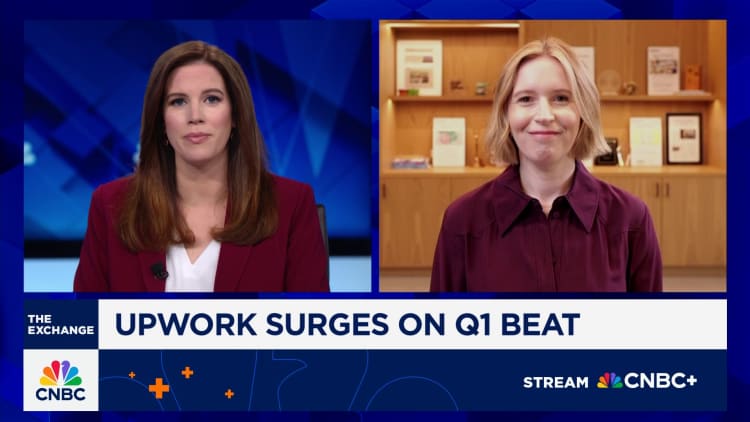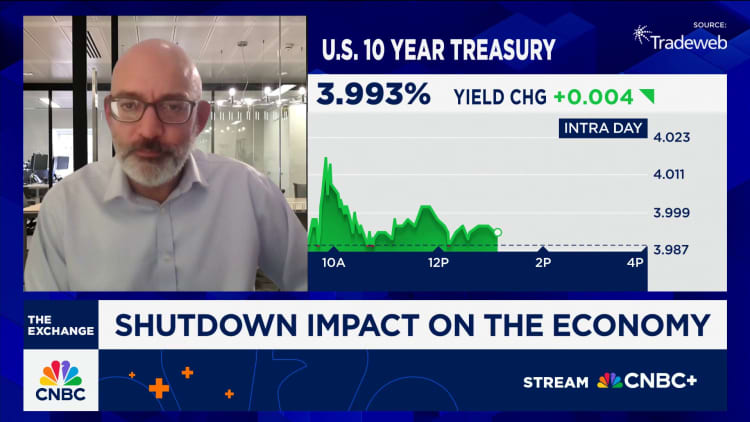Debt is a ‘growing force’ influencing jobseekers’ choices, expert says

Svetikd | E+ | Getty Images
Many Americans are carrying debt — and for some, the liability is influencing their career choices and job hunting behaviors.
“Debt is a growing force behind why people take certain jobs, stay in roles longer than they’d like, or hesitate to make a career pivot,” said Priya Rathod, a career trends expert at Indeed, a job posting site.
About 38% of survey respondents said they took on a second job to pay their debts, according to a new report by Zety, a resume templates site. A similar share, 37%, said they accepted jobs outside their industry or positions they weren’t interested in just to repay their outstanding balances.
About 37% owe less than $10,000, the site found. However, about 20% owe up to $25,000 while for 10%, the balance is as high as $100,000.
What types of debt survey respondents have varies. Most, or 71%, said to have credit card debt, per Zety data, while 37% have mortgage debt, 30% have an auto loan and 23% have student loans, among other kinds of debt.
The survey polled 1,005 U.S. employees on April 12.
More from Personal Finance:
Student loan borrowers face ‘default cliff’ as late payments climb
How the GOP budget bill targets immigrant finances
FEMA is not a ‘replacement for insurance coverage,’ expert says
The data shows that surveyed workers may not be earning enough to meet their financial obligations, and in some cases, fund their aspirations, according to Jasmine Escalera, a career expert at Zety.
If it weren’t for their debt, 17% of respondents said they would start a business, go back to school or freelance, per the report.
“Their financial status is impacting not just them in terms of their work and their 9-to-5, but also those life goals,” Escalera said.
Second jobs ‘driven by necessity’
When workers begin to search for side hustle or second job, it’s often because their wages are not keeping up with their cost of living or financial obligations, experts say.
About 52% of polled workers said they have a side hustle in order to make ends meet, according to Indeed data provided to CNBC. In mid-May, the site polled 1,256 U.S. adults who are employed full time or part time, or seeking employment.

The decision to take on a second job may also come out of fear for the state of the economy, Rathod said.
About 46% of respondents said they’re concerned about being laid off in the next year, so they want to make sure they are able to protect themselves by working side jobs, Indeed found.
“It’s driven by necessity,” said Rathod.
But picking up extra work can come with trade-offs, such as feeling burnout or stress, she said.
Growing your income is ‘a long-term strategy’
While taking on a second job for more income may sound like a viable solution to pay down debt, consider asking for a raise or seeking a promotion in your current job first, experts say. If that doesn’t work, there are other steps to consider, like pivoting to a higher-paying role or new industry.
“People really need to understand that working more hours is a short-term solution, and growing your main income is a long-term strategy,” Rathod said.
If you’re noticing that wage growth is slowing down in your company or industry, it may be difficult to get a raise, said Rathod. Instead, negotiate for parts of your total compensation, such as the flexibility to work hybrid or remote, more stock options, wellness benefits or a stipend for continuing education.
Otherwise, consider applying to a new role that pays more, whether internally or in a new company, or switching to a different industry that has better growth prospects, Rathod said. For example, someone who works in sales could apply those skills in a variety of fields, like health care, which is growing.
In May, nearly half of the job growth came from health care, which added 62,000 jobs, according to the Bureau of Labor Statistics.
Think about how your skills can transfer to roles in a new sector, or find ways you can “upskill” — to expand your existing abilities, per LinkedIn — to get your foot in the door, Rathod said.
If you still believe that you need an additional source of income rather than a new role, think about the skills that you already have and what you’re good at, experts say.
Also make sure that the additional hours do not interfere with your primary source of income and other areas of your life, Escalera said.
<





